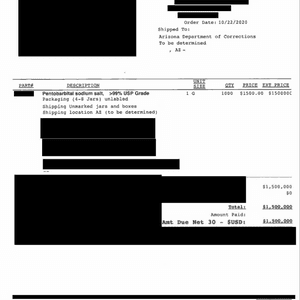How Much Money Does Government Spend Per Prisoner
Overview
The capital punishment is a moral event for some and a policy outcome for others. Nevertheless, it is also a government program with related costs and possible benefits. Many people assume that the country saves money past employing the death penalty since an executed person no longer requires confinement, health intendance, and related expenses. But in the modern application of capital punishment, that supposition has been proven incorrect.
The death sentence is far more expensive than a system utilizing life-without-parole sentences every bit an alternative punishment. Some of the reasons for the high cost of the death sentence are the longer trials and appeals required when a person's life is on the line, the need for more lawyers and experts on both sides of the case, and the relative rarity of executions. Most cases in which the capital punishment is sought do not end up with the expiry penalty being imposed. And once a decease sentence is imposed, the most probable outcome of the case is that the conviction or death judgement will be overturned in the courts. Most defendants who are sentenced to death essentially end upwardly spending life in prison, but at a highly inflated cost because the death penalty was involved in the process.
The Event
How much the expiry penalization actually costs and how that compares to a organization in which a life sentence is the maximum punishment can simply be determined by sophisticated studies, usually at the state level. Many such studies take been conducted and their conclusions are consequent: the death penalty imposes a net toll on the taxpayers compared to life without parole. The question is whether the assumed benefits of the death penalization are worth its costs and whether other systems might provide similar benefits at less toll. The assessments of law enforcement experts are specially relevant in identifying what expenditures are virtually effective in reducing crime.
What DPIC Offers
This section contains summaries of each of the main cost studies on the death punishment and links to many of the entire studies. In addition, DPIC has prepared a number of reports that chronicle to the question of costs and to the opinions of police chiefs and other experts in this field.
Why is the decease punishment and then expensive?
- Legal costs: Almost all people who face the death penalty cannot afford their own attorney. The state must assign public defenders or court-appointed lawyers to stand for them (the accustomed practice is to assign two lawyers), and pay for the costs of the prosecution likewise.
- Pre-trial costs: Capital letter cases are far more complicated than not-capital cases and take longer to go to trial. Experts volition probably be needed on forensic evidence, mental wellness, and the background and life history of the defendant. County taxpayers pick up the costs of added security and longer pre-trial detention.
- Jury choice: Because of the need to question jurors thoroughly on their views about the death sentence, jury pick in capital cases is much more than time consuming and expensive.
- Trial: Death-penalty trials can last more than than iv times longer than non-capital trials, requiring juror and attorney compensation, in add-on to court personnel and other related costs.
- Incarceration: About expiry rows involve lone confinement in a special facility. These require more security and other accommodations as the prisoners are kept for 23 hours a solar day in their cells.
- Appeals: To minimize mistakes, every prisoner is entitled to a series of appeals. The costs are borne at taxpayers' expense. These appeals are essential because some inmates have come within hours of execution before evidence was uncovered proving their innocence.

News & Developments










Source: https://deathpenaltyinfo.org/policy-issues/costs
Posted by: hillsidia1949.blogspot.com

0 Response to "How Much Money Does Government Spend Per Prisoner"
Post a Comment